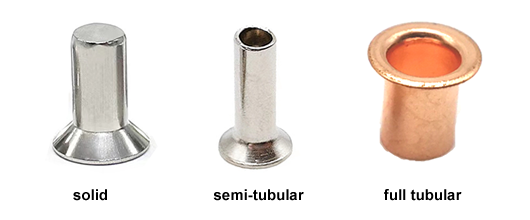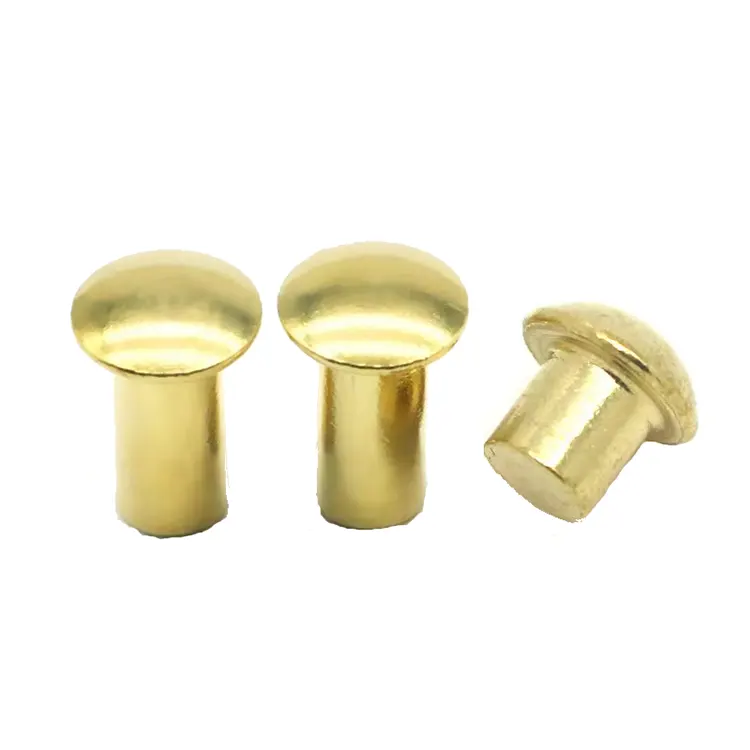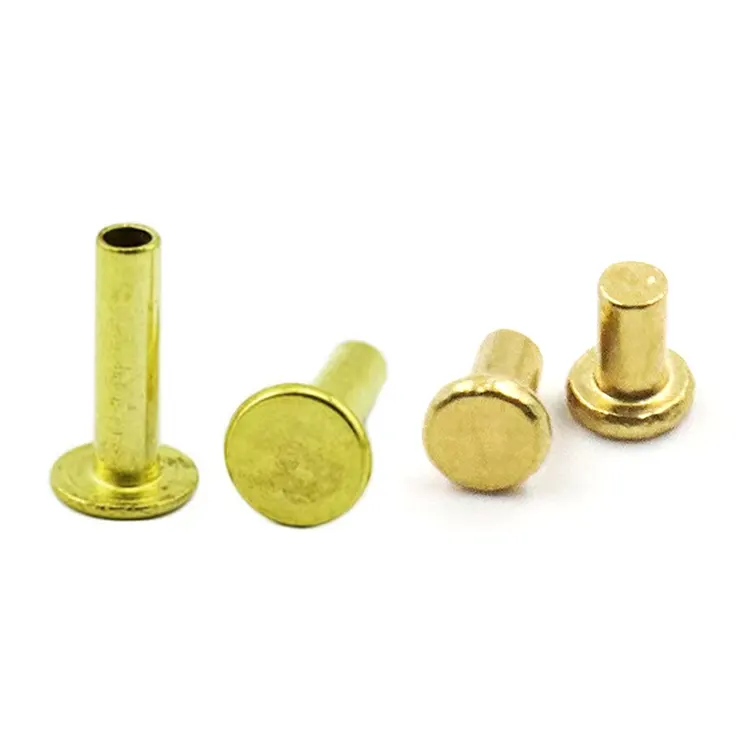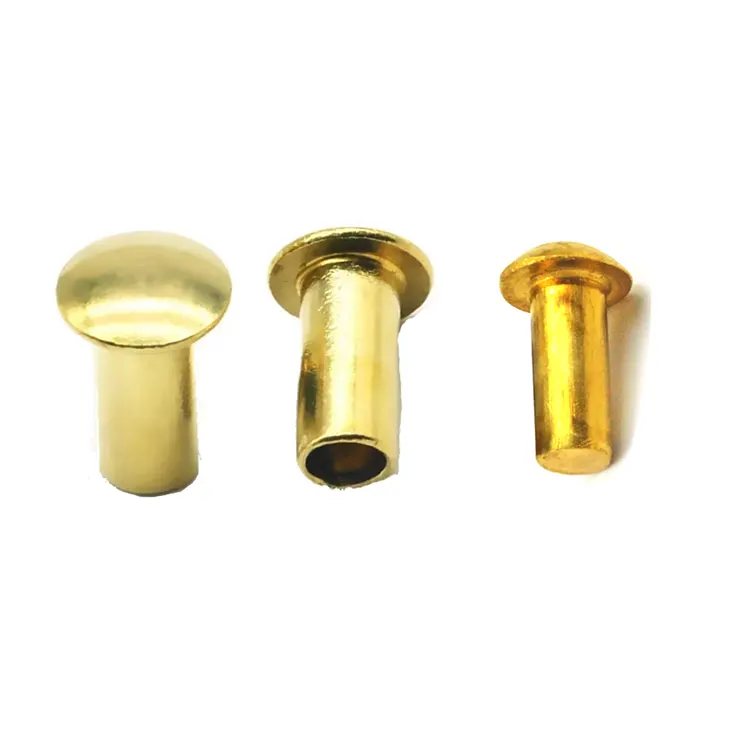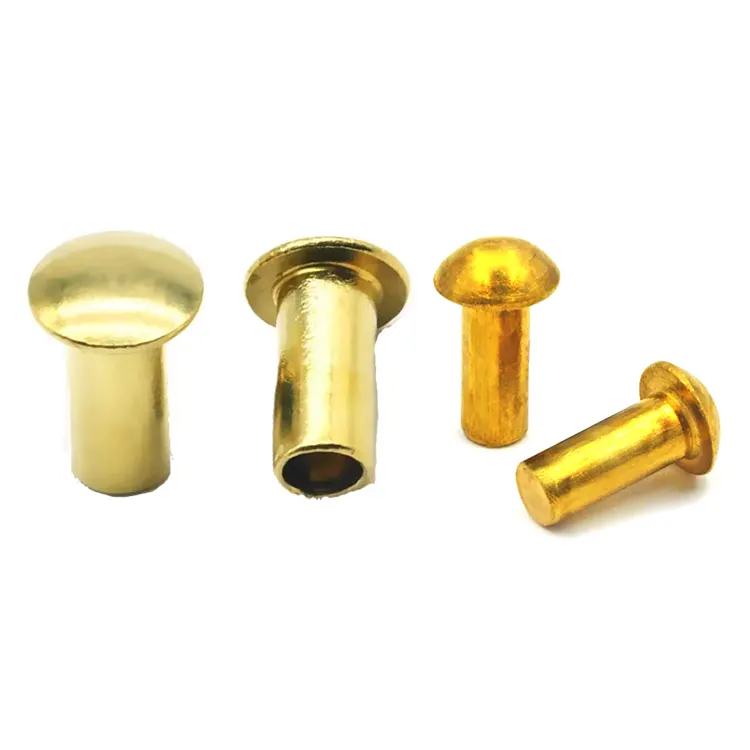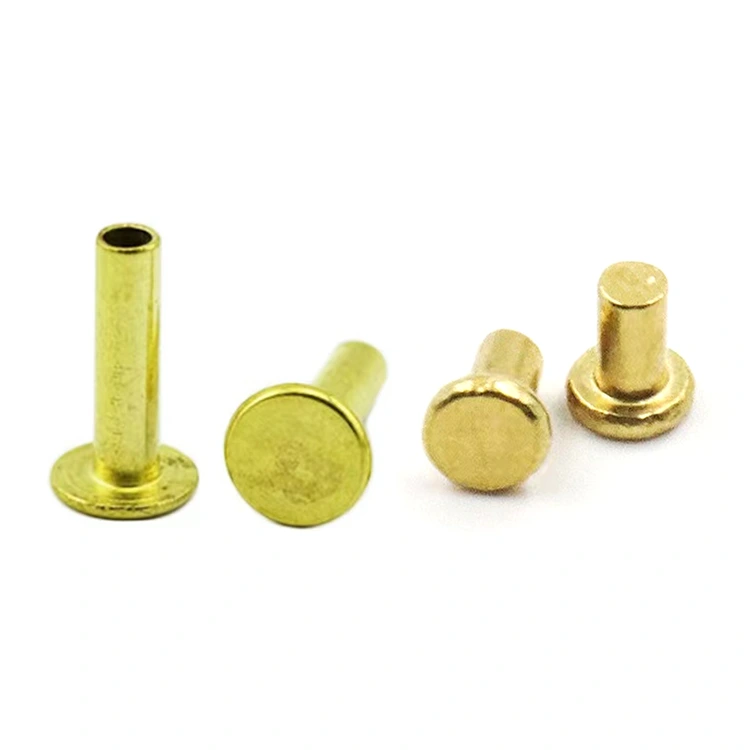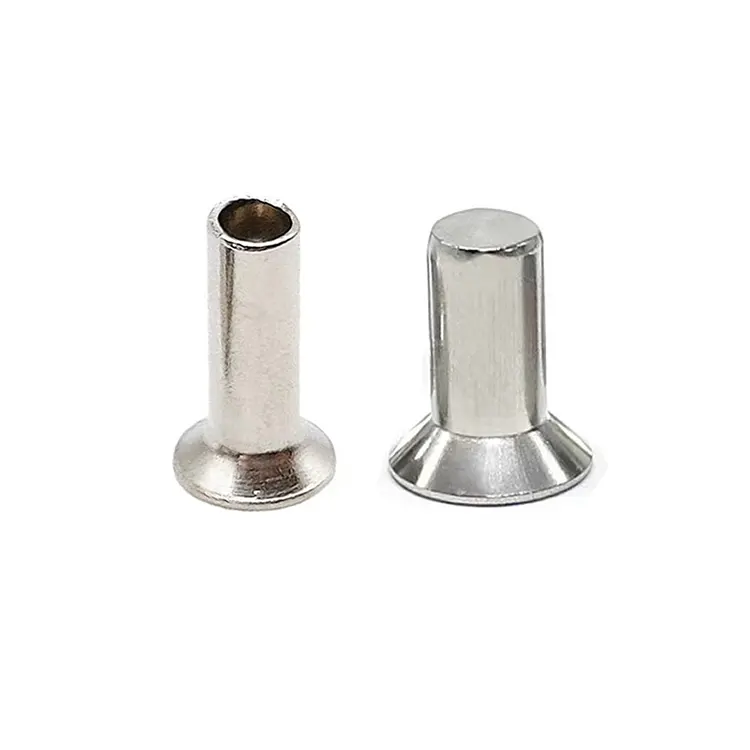Remaches
As one of professional manufacturer in China, Notin would like to provide you Rivets. And we will offer you the best after-sale service and timely delivery.
What is a rivet?
A rivet is a permanent mechanical fastener used to join two or more materials. Rivets work by inserting a metal pin into an aligned hole and deforming the end, creating a strong, secure, and durable connection. Unlike temporary fasteners like screws, rivets do not rely on threads, but instead form a permanent connection, making them ideal for applications requiring high strength, durability, and vibration resistance.
Classification of Rivets
Rivets are typically categorized by head shape, degree of hollowness, or material.
Based on head shape, rivets can be classified as flat head rivets, round head rivets, countersunk head rivets, mushroom head rivets, universal head rivets, truss head rivets, etc.

Based on degree of hollowness, rivets can be classified as solid rivets, semi-tubular rivets, or full tubular rivets.
Based on material, rivets can be classified as brass rivets, stainless steel rivets, steel rivets, aluminum rivets, copper rivets, etc.

What surface finishes are available for rivets?
Rivet surfaces are typically treated with rust-proofing treatments, primarily electroplating, including zinc plating, nickel plating, chrome plating, tin plating, gold plating, and silver plating. Electroplating is a common rust-proofing method for rivets. It applies a layer of plating to the rivet surface through physical or chemical methods. The plating effectively prevents corrosion and rust, while also providing a certain aesthetic effect.
Another special surface treatment method is head coating. Head coating is performed after the rivet is electroplated. This allows for a variety of colors on the rivet head, achieving an aesthetically pleasing finish.
Aluminum rivets cannot be electroplated, but they can be anodized. Anodizing also allows for a variety of color options, but the unit price is higher than electroplating.
Rust-proofing the rivet surface is crucial, effectively extending the rivet's service life and ensuring a secure connection. Different rust-proofing methods are suitable for different environments and applications, so the choice should be tailored to the specific situation.
- View as
Remaches de cabeza redonda de latón
Nuote Metals se especializa en la producción y venta de remaches de cabeza redonda de latón. Estamos ubicados en Dongguan, China, una ciudad con un fuerte desarrollo industrial. Nuestros remaches de cabeza semi abultada de cobre constan de un vástago y una tapa hechos de aleación de latón. El diseño del cabezal semibulto proporciona una distribución uniforme de la presión, evitando daños a la superficie de la articulación. Se caracterizan por su conductividad eléctrica combinada y resistencia a la corrosión, construcción simple, fácil instalación, alta confiabilidad y larga vida útil.
Leer másEnviar ConsultaRemaches de latón
Nuote Metals produce remaches de latón en China; los remaches de latón se fabrican principalmente de una aleación de cobre y zinc, un material que ofrece una serie de ventajas. La excelente resistencia a la corrosión del latón le permite soportar un uso prolongado en ambientes húmedos sin oxidarse, lo que lo hace adecuado para uso en exteriores o en condiciones de alta humedad. El latón también posee resistencia y dureza, lo que le permite resistir tensiones mecánicas manteniendo una buena tenacidad y resistiendo roturas. El latón también tiene una excelente conductividad eléctrica y térmica, lo que lo hace adecuado para su uso en equipos electrónicos y térmicos. La superficie lisa del latón permite galvanizar o pulir fácilmente, mejorando su estética. Estas propiedades hacen que los remaches de latón sean la opción preferida en muchas industrias.
Leer másEnviar ConsultaRemaches de cabeza plana de latón
Nuote Metals se especializa en la producción de remaches de cabeza plana de latón. Nuestros remaches están hechos de latón H65, que tiene un alto contenido de latón, es suave y se forma fácilmente, y es menos probable que se agriete durante el proceso de remachado. Los remaches de cabeza plana de latón constan de una cabeza y un vástago, siendo el vástago hueco en aproximadamente la mitad de su longitud. Durante la instalación, el remache se inserta en un orificio previamente perforado. Usando una máquina remachadora especializada y un punzón, el extremo del vástago se expande y forma la cabeza en el otro lado, creando una conexión de sujeción. Este proceso se basa en la deformación plástica del metal, eliminando la necesidad de soldaduras o adhesivos, haciéndolo simple y eficiente.
Leer másEnviar ConsultaRemaches de cabeza de hongo de latón
Los remaches de latón con cabeza de seta constan de una cabeza y un cuerpo. La cabeza es redonda y ligeramente aplanada, parecida a un sombrero de hongo. El cuerpo es semihueco, lo que significa que tiene un agujero en el centro pero no atraviesa completamente. Estos se denominan remaches de cabeza de hongo semihuecos de latón. Algunos remaches tienen un cuerpo sólido, llamados remaches de cabeza de hongo macizos de latón. Durante la instalación, se utiliza una herramienta especializada para insertar el cuerpo en el orificio previamente perforado. Se aplica presión para deformar el cuerpo, lo que hace que se expanda y agarre el material, creando una conexión segura. Nuote Metals se especializa en la producción de estos remaches de latón con cabeza de seta.
Leer másEnviar ConsultaRemaches de cabeza plana de latón
Los remaches de cabeza plana de latón son varillas de metal con una tapa en un extremo. Logran el remachado mediante deformación o ajuste por interferencia y son un sujetador común. El diseño de cabeza plana reduce las protuberancias de la superficie, lo que lo hace adecuado para aplicaciones que requieren una gran planitud. La resistencia a la corrosión del latón garantiza la estabilidad de la conexión incluso en ambientes húmedos y corrosivos. Nuote Metals se especializa en la producción de remaches de cabeza plana de latón. Contamos con miles de moldes y podemos producir una variedad de especificaciones de remaches. También admitimos diseños y muestras personalizados.
Leer másEnviar ConsultaRemaches de cabeza avellanada de latón
Los remaches de cabeza avellanada de latón constan principalmente de una cabeza y un vástago. La cabeza avellanada permite una instalación al ras con la superficie de la pieza de trabajo, eliminando protuberancias que podrían afectar la apariencia o el funcionamiento. El vástago semihueco se deforma durante el proceso de remachado, logrando una conexión. Este diseño no sólo mejora la eficiencia de la instalación sino que también mejora la confiabilidad de la conexión. Nuote Metals se especializa en la fabricación de remaches de cabeza avellanada de latón, de alta precisión y con una superficie lisa y sin rayones. Damos la bienvenida a amigos de todo el mundo para que visiten nuestra empresa y colaboren con nosotros.
Leer másEnviar ConsultaWhat are the advantages of rivets over other fasteners?
1. Ease of Installation
Rivets are fast to install, and even fully automated for high-volume applications, resulting in a simple and efficient operation process.
2. Connection Reliability
The riveting process is standardized, with strict quality control, resulting in highly stable connections. Visual inspection allows for quick verification of connection quality.
3. Vibration and Impact Resistance
Rivets connect through deformation or interference fit, providing strong clamping force and excellent vibration resistance, capable of withstanding vibration and shock.
4. Low Cost
Rivets are easy to install and can be fully automated, saving significant labor costs.
What are the advantages and disadvantages of rivets made of different materials?
Aluminum Rivets
Advantages: Lightweight, reduces overall product weight, low cost, suitable for general civilian applications.
Disadvantages: Low tensile and shear strength, unsuitable for high-strength workpieces, prone to electrochemical corrosion when in contact with metals such as stainless steel.
Stainless Steel Rivets
Advantages: Strong corrosion resistance, high hardness, suitable for high-strength workpieces (such as marine equipment)
Disadvantages: Higher cost, typically more expensive than aluminum rivets of the same specification.
Brass and Copper Rivets
Advantages: Excellent conductivity (such as connecting electronic components), good corrosion resistance.
Disadvantages: Higher cost, more difficult to process.
Steel Rivets
Advantages: High hardness, high connection reliability, and wide applicability.
Disadvantages: Compared to other materials, iron rivets are more prone to rusting.
What are the main applications of rivets?
Rivets have a wide range of uses, from small items like a pair of scissors to large items like airplanes and ships, as well as in high-precision medical applications.
Industrial Manufacturing
Rivets are used in a wide variety of industrial fields, wherever there is a need to connect two or more materials.
Electronics
Rivets secure heat sinks and chips, providing both vibration damping and noise reduction, and are widely used in the cooling systems of electronic products such as computers and mobile phones.
Automotive
Rivets are widely used to connect components of automobile bodies and chassis, such as doors and hoods. Their lightweight and corrosion-resistant properties make them an indispensable joining method in automotive manufacturing.
Aerospace
In aircraft manufacturing, rivets are used to connect different fuselage components, such as wings and tailplanes. Millions of rivets create high-strength, corrosion-resistant joints. Aluminum and titanium alloy rivets are often used to connect components of corresponding materials, ensuring stability in extreme environments.
Rivets are used everywhere. The above examples only represent a small number of their applications. We see rivets everywhere in our daily lives, such as on scissors, folding beds, and strollers etc. Rivets can be customized to different sizes and materials depending on the application.
Nuote Metals has specialized in the rivet industry for over a decade. Our factory is located in Dongguan, a city known as the "World Factory," a city with a developed industry and convenient transportation. This allows us to respond quickly when acquiring raw materials and supporting surface treatments, meeting our customers' needs for quick access to samples and bulk orders. We produce 10 million rivets daily and have molds of various specifications, allowing us to produce rivets as small as 0.8mm and as large as 10mm. We welcome your inquiries and visits.






